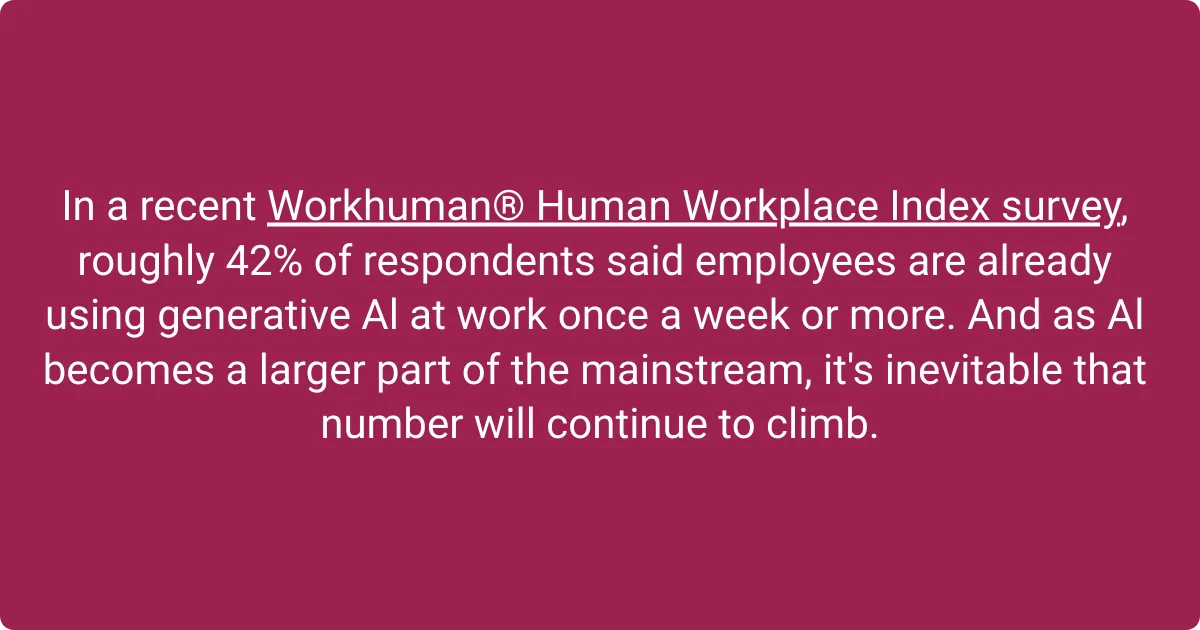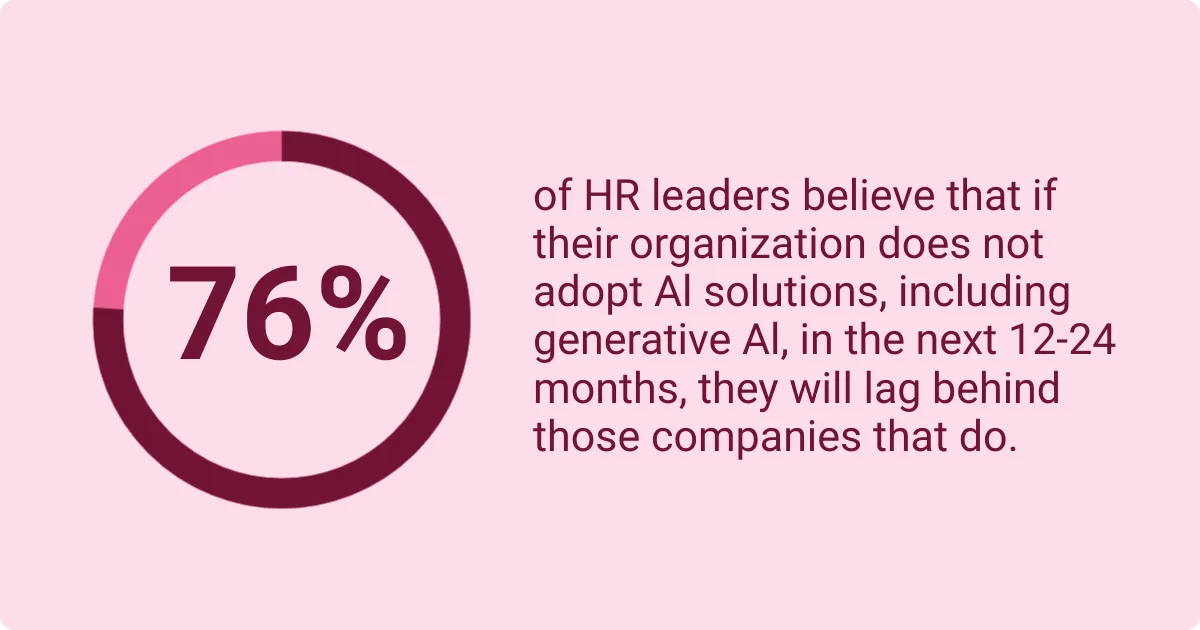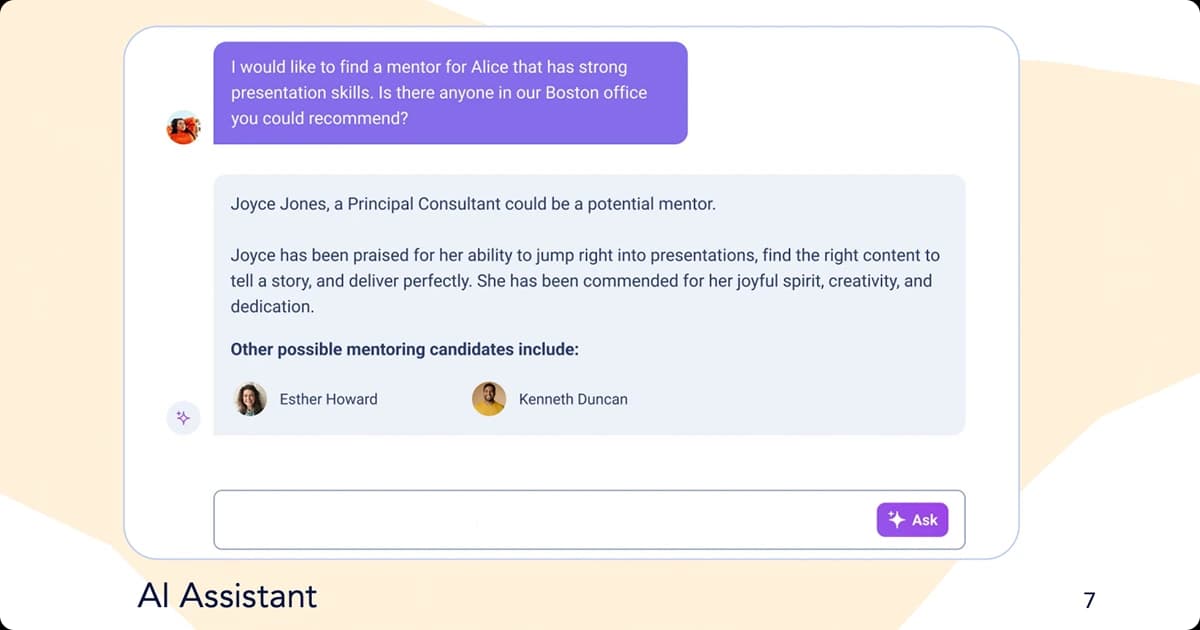Applications of Artificial Intelligence in Business: Technologies, Uses, and Real-World Examples

Artificial intelligence (AI) adoption is on the riseOpens in a new tab, with organizations recognizing its potential to drive efficiency and remain competitive. From its early applications in specific industries to its widespread integration across various sectors, AI has evolved significantly – and this is just the beginning. However, with this growth also come AI adoption challenges that organizations must navigate to ensure successful implementation and integration.
Defined as the ability of machines to simulate human intelligence, AI is being used to automate tasks, analyze data, mitigate risk, and inform decisions. As we explore common applications of artificial intelligence in business, we'll learn how AI is being used to revolutionize industries and shape the future of work.

Understanding popular AI technologies
Learning what AI is capable of and how it can help your business is the first step in adopting or developing a product or technology for your business. Many artificial intelligence technologies work together and complement each other to improve processes and products. Let's examine what each technology can do and how it applies to the business world.
Machine learning and deep learning
Machine learning is the basis of most AI systems. It allows computers to learn from data and improve their performance over time.
Machine learning algorithms are used for tasks in business like:
- Predictive analytics like forecasting sales, customer churn, and employee turnover
- Grouping customers based on behavior and preferences
- Automating repetitive tasks like data entry and report generation
- Suggesting products, services, or content based on user preferences
Deep learning is a subset of machine learning that uses artificial neural networks to learn from complex patterns in data. You likely have heard the term "generative AIOpens in a new tab" – it is a subset of both machine and deep learning, and it does many of the tasks people think of when they think of AI today, such as:
- Identifying objects and scenes within images
- Creating art, music, or text
- Identifying unusual patterns in data to detect fraudulent activity
- Suggesting products or content based on individual preferences
Natural Language Processing (NLP)
Natural language processing (NLP) is a field of artificial intelligence that enables computers to understand and interpret human language. NLP is an AI application of machine learning that often leverages deep learning to reach peak performance. NLP powers tasks or functions such as:
- Chatbots or virtual assistants
- Scanning text for patterns or trends (this is known as sentiment analysisOpens in a new tab)
- Language translation
- Text summarization
Discover how Workhuman's Inclusion Advisor can help build a culture of equity and belonging, driving your organization towards genuine inclusivity.
Computer vision
Computer vision enables computers to understand and interpret visual information. It uses machine learning and deep learning techniques to train models to recognize objects, scenes, and patterns in visual data. In an HR setting, computer vision could analyze video interviews to assess a candidate’s communication skills and/or body language.
Robotics Process Automation (RPA)
Robotics Process Automation (RPA) is a technology that automates repetitive, rule-based tasks. While RPA doesn't necessarily involve machine learning or deep learning directly, it can be enhanced by these technologies. For example, RPA can be combined with computer vision to automate tasks that involve visual data, such as extracting information from documents or processing images.
Top applications of AI in business functions
Customer service and experience
Using artificial intelligence to improve customer service and experience might sound like an oxymoron – the customer experience should be human. However, AI tools can help interpret customer behavior and ensure that they are getting what they need faster and more efficiently, letting them go back to their lives and have a positive view of your product, brand, and organization. AI can do this by using:
- AI-powered chatbots and virtual assistants can respond to customer queries in real time.
- Personalized customer interactions
- Sentiment analysis for customer feedback
- Predictive customer service
Sales and marketing
Implementing AI tools and systems gives sales and marketing teams a competitive edge. Artificial intelligence can be used to inform and build out sales and marketing strategies by assisting with:
- Lead scoring and qualification
- Personalized marketing campaigns
- Dynamic pricing strategies
- Content development, research, and curation
- Predictive sales forecasting
Finance and accounting
AI’s ability to rapidly find errors and predict trends and risk assessment makes the case for business applications for finance and accounting an easy sell.
Beyond data analysis, artificial intelligence helps finance and accounting teams:
- Detect and prevent fraud
- Run algorithmic trading
- Assess and manage risks
- Automate financial reporting, analysis, and auditing
Human resources
In human resources, AI can be implemented to give leaders a clear view of the performance and behaviors of their workforce. Artificial intelligence in the recruitment process can decrease bias in the hiring process, improve employee onboarding, and, ultimately, boost employee engagement. HR teams can use AI to:
- Recruit and screen candidates
- Understand employee performance and highlight skill gaps
- Create personalized learning and development programs using AI training for employees
- Enhance HR analytics and reporting

Workhuman iQ can transform your understanding of the employee experience with AI-powered social analytics to unlock data-driven strategy. It's the kind of intel you’ve always wanted, delivered in a way that anyone can use.
Operations and supply chain management
Business applications of AI for operations and supply chain management can automate processes and enhance decision-making, leading to increased efficiency, reduced costs, and improved productivity. Specific use cases include:
- Demand forecasting and inventory optimization
- Predictive maintenance
- Quality control and defect detection
- Computer vision can monitor production lines and improve quality issues
- Supply chain optimization and logistics
- Process automation
See also: How to Use AI in Employee Engagement to Transform the Workplace Experience
Research and development
The range of AI applications for research and development teams is diverse and wide-reaching; artificial intelligence can be used for automating repetitive tasks and in the long run, ultimately help save lives. AI in research and development might look like:
- Faster discovery and development
- Product design optimization
- Patent analysis and innovation tracking
- AI-assisted scientific research
IT and cybersecurity
Speed is crucial to the health of a company after a cyberattack; artificial intelligence gives IT departments and cybersecurity teams a competitive advantage by speeding up response times after a breach and predicting threats and risks. Aside from saving teams time and resources, AI can be used to:
- Detect network security and other threats
- Automate code generation and testing
- Improve overall data security
- Manage IT services and predictive maintenance
- Optimize data centers
Decision support and business intelligence
Business intelligence and decision support teams are inundated with massive amounts of data. AI in business intelligence can be a fantastic asset for these teams by quickly uncovering metrics that are challenging or nearly impossible for humans to interpret. Beyond uncovering trends and patterns, AI can help decision-support teams with:
- Data analytics and insights generation
- Machine learning algorithms can predict future trends or outcomes
- Business forecasting, such as scenario planning and simulation
- Real-time business intelligence dashboards that allow teams to respond to changing conditions
Product development and innovation
What organization doesn’t strive for accelerated development and reduced testing costs? AI and human creativity together can help product and innovation teams meet customer needs, generate new ideas, spot emerging trends, and optimize designs. Organizations can adopt AI on their product teams with specific applications such as:
- Generative design for product development
- Customer feedback analysis for product improvement
- AI-assisted prototyping and testing
Legal and compliance
Artificial intelligence can act as a safeguard for legal and compliance teams and businesses by reducing human error, speeding up data analysis, automating routine and repetitive tasks, and identifying potentially harmful patterns and trends.
Specific applications include:
- Contract analysis and management
- Regulatory compliance monitoring
- Legal research and case prediction
- Intellectual property management
Seven real-world applications of AI in business
Workhuman
With the latest advancements from Workhuman iQ, you can now solve all your most pressing workplace challenges. Human Intelligence™ allows you to mine the uniquely rich data of employee recognition, giving you unparalleled insights into your people’s skills, the ROI of HR programs, and how work is getting done across your organization.
Using generative AI, the AI Assistant takes in data from multiple sources and surfaces valuable business and culture insights based on a specific prompt – e.g., “Who are the high-performers across the organization?”
The result? Human Intelligence helps you transform your culture and propel your business performance.

Bank of America
Bank of America's AI-powered virtual assistant, Erica, assists customers with account inquiries, transactions, and financial advice, providing a convenient and fast experience. This saves customers from dealing with long phone holds and trips to the bank.
Amazon
Amazon's product recommendation engine analyzes customer behavior and suggests relevant product recommendations, which increases customer satisfaction and drives sales.
Pfizer
Pfizer exemplifies the power of AI in research and development. Its AI has enabled the company to identify promising drug candidates and advance them through the development pipeline.
Pfizer knew they needed a recognition and rewards program that was scalable and agile, global, peer-to-peer, equitable, and most importantly, impactful. See how Pfizer partnered with Workhuman to build their platform, Bravo!
JP Morgan Chase
JPMorgan Chase's Contract Intelligence (COiN) platform uses AI to interpret loan applications, freeing employees to work on more complex tasks.
Walmart
Walmart uses AI to predict demand and optimize stock levels across its stores, leading to significant cost savings and improved customer satisfaction.
Netflix
Netflix’s AI scans customer data to identify popular genres, predict viewer preferences, and inform decisions about which shows to create or license, driving audience engagement and revenue.
Conclusion
From automating routine tasks to providing valuable insights, the applications of artificial intelligence in business are diverse and far-reaching. The transformative potential of AI is huge, offering opportunities for increased efficiency, improved decision-making, and enhanced customer experiences.
To stay competitive, businesses must actively explore AI opportunities and introduce their workforce to the possibilities. By understanding the various applications and considering their specific needs, organizations can tap into the power of artificial intelligence to drive innovation, growth, and success.
About the author
Alicyn Zall
Alicyn Zall is a writer dedicated to creating a more equitable and fulfilling workplace. With a focus on actionable, data-driven insights, her work empowers individuals and organizations to foster positive change. In addition to her contribution at Workhuman, Alicyn has served as an editor at Harvard Business Review where she developed books and articles about mental health and the future of work.